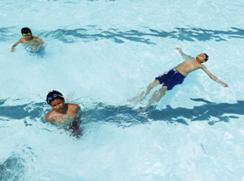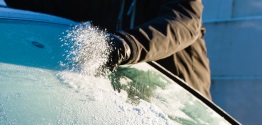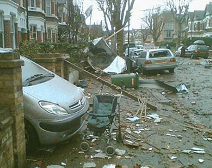What to do in severe weather
Extreme heat
Extreme heat can make living, working and travelling round the city uncomfortable.
It can also cause illness or death – very young or elderly people, and people with heart and respiratory problems are particularly at risk.
What you can do
-
Stay out of the sun during the hottest part of the day (11am–3pm).
-
Keep rooms cool by using shades or reflective material outside the windows, or using light-coloured curtains and keep them closed (metallic blinds and dark curtains can make the room hotter).
-
Drink regularly, even if you do not feel thirsty – water and fruit juice are best.
-
Take cool showers or baths and splash yourself with cool water.
-
Wear loose, cool clothing and a hat when you do go outside.
-
Check up on friends, relatives and neighbours who may be less able to look after themselves.
The Met Office operates Heat-Health Watch from 1 June to 15 September each year. Read more about Heat-Health Watch on the Met Office's website.
Snow and ice
We share responsibility for gritting and keeping roads open with Transport for London (TFL). Visit TFL's website.
Read more about gritting in icy weather.
What you can do
Find out how to keep warm and well on the NHS website.
-
Only go out if you have to.
-
If you do have to go out, check the weather forecast first. If driving, follow the Highway Code. Read the Highway Code for driving in adverse weather conditions on the Government's website.
-
Be a good neighbour (while following the COVID-19 restrictions). Often the people most at risk during cold weather are the least willing to ask for help. Check up on neighbours, relatives or friends who may be more vulnerable in cold weather – make sure they’re warm enough and have enough food and medical supplies. You can refer especially vulnerable residents to the South London Advice and Referral Network.
-
Help keep pavements clear. Get advice on how to clear snow and ice from outside your home.
Find out more about getting ready for winter.
Storms and gales
Strong winds can damage buildings and infrastructure (e.g. power supplies and transport networks) as well as endanger lives. If storms bring heavy rain, this may cause flooding.
If storms and gales are forecast, the Met Office will issue a Severe Weather Warning. Find out if a Severe Weather Warning has been issued on the Met Office website.
Read more about Sever Weather Warnings on the Met Office's website
What you can do
-
Avoid travelling wherever possible.
-
Make sure anything left outside is tied down or brought inside.
-
Prepare for possible power cuts – have emergency supplies to hand, e.g. have tinned or prepared food ready, a battery powered or wind-up radio and torch. Read more about preparing supplies for an emergency.
-
Make sure you are prepared for possible flooding if heavy rain is forecast. Read more about preparing for flooding.
-
Ask your neighbours if they need any help, particularly if they are elderly or vulnerable.
You can report a storm-damaged tree online.
Please note we will not usually remove storm-damaged trees in private gardens, on private roads or on ‘red routes’ maintained by Transport for London.
Schools in severe weather
How to find out if any schools are affected by severe weather.
Useful websites
Contact
Emergency Planning
Email inbox is for routine queries only. The inbox is monitored Monday-Friday 9am-5pm.


